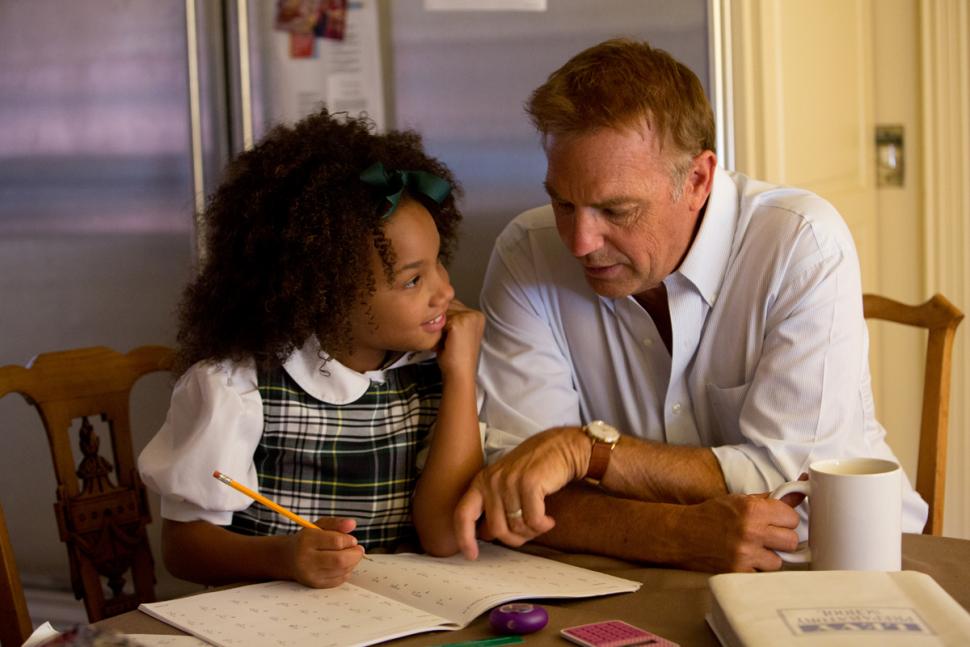

Good intentions do not always equal a good movie. This is the situation with Mike Binder’s recent film, “Black or White.” This film highlights the importance of having open discussions concerning race, but it fails to meaningfully address the issues it tackles within its two-hour runtime. Binder, who both directed and wrote the film, clearly attempts to focus on race relations in the modern American society. This in itself is an accomplishment considering that surprisingly few recent films have broached this subject, with the notable exception of Justin Simien’s “Dear White People.” Unlike ”Dear White People,” “Black or White” fails to successfully unite the film’s elements in order to realize the director’s thematic vision.
The film follows Elliot Anderson (Kevin Costner) and his trials in raising his biracial granddaughter, Eloise (Jillian Estell), after his beloved wife passes away. In light of this tragedy, Elliot must learn how to raise the girl with whom he rarely spends time. He faces a steep learning curve, but his granddaughter seems forgiving, and helps give him a sense of direction in his life. All seems well until Rowena Jeffers (Octavia Spencer), otherwise known as Grandma Wiwi, comes into the picture and demands full custody of Eloise. Who can provide the best care for Eloise? What begins as a custody battle soon boils down to a race issue. Should she live alone with her gruff grandfather where her young life is already established, or should she learn about her black culture from her grandmother?
As far as most family drama goes, “Black or White” takes the idea of love and happiness to another level. Rowena’s lawyers point to race as the sole reason why Elliot refuses to give up custody. However, Elliot’s lawyers are more concerned with the return of Eloise’s father, who has fallen into a spiral of drug addiction. Time after time, Elliot claims that race is not an important matter in this custody battle. At one point, he delivers a sweeping monologue about how race is merely a flaw that humans have been trained to notice, (Here he compares first noticing skin color to noticing the breasts of an attractive woman; it’s shameful that he notices it first, but just one thought about race does not make him a racist.) Binder essentially tries to elevate a custody battle to the extreme in order to point out the obvious flaws of racial prejudice.
Of course, trying is not the same as succeeding. “Black or White” captures the audience with the buildup to the custody battle only for it to quickly fall apart under its identity as a family drama. In some ways, it’s painfully obvious how this film will end. After all, Binder tries to show that the United States has evolved since slavery and the Civil Rights movement. Perhaps the only success Binder achieved was highlighting the racial prejudice that continues to exist today. Seemingly cheery scenes of Elliot watching Eloise learn piano or an upbeat family pool party are contrasted with more sobering scenes.
“Are you really going to raise a black girl all by yourself?” one character asks Elliot.
“If Elliot won’t let you have custody, then that man hates black people.” says one of Rowena’s lawyers.
While in these scenes the film offers us a thought-provoking depiction of race relations in modern-day America, the film’s truly insightful moments are few and far between.
Perhaps it was too ambitious for Binder to attempt tackling the monumental issue of American race relations in this already-complicated story about a child custody battle. One of the film’s flaws lies in Binder’s choice to give the majority of camera time to Elliot Anderson instead of Eloise, who ended up with one close-up that I noticed. Binder did not push far enough in his discussion about race because his focus remained on the white man rather than the biracial girl. Although Binder does some things right in his film, these issues are so problematic that it’s hard to consider the film truly successful. Perhaps another film will arise with this a theme similar to that of “Black or White” and execute it with more mastery and tact.